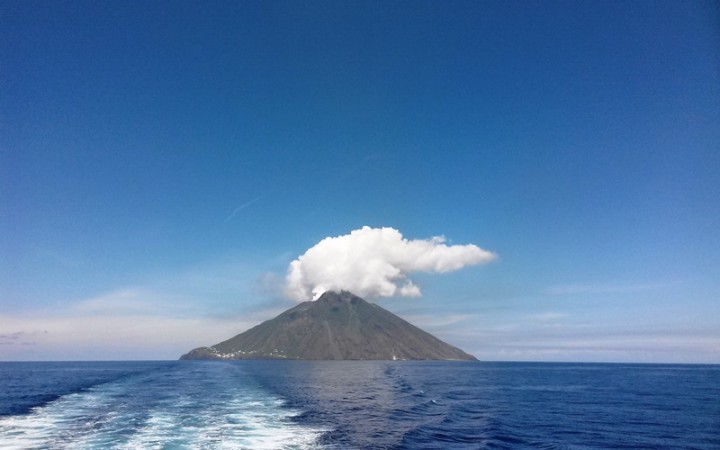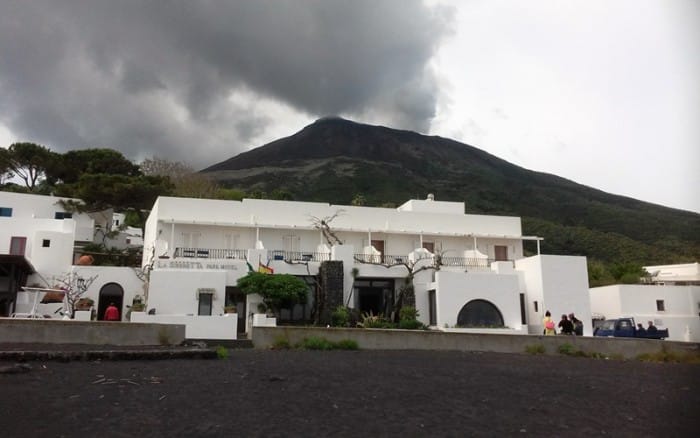Stromboli is the kind of volcano you see in cartoons. It is a steep, dark cone rising from the sea with a plume of smoke. Stromboli is exactly what I imagined volcanoes to look like when I was young: every forty minutes or so, there is an eruption that releases a great spout of lava and a lion’s roar. It is the kind of volcano that I used to imagine the Greek philosopher Empedocles throwing himself into to prove his immortality.
Stromboli’s isolation makes it appear foreboding: it dominates the horizon completely, a lone black triangle with a tuft of pale grey against the flat, endless sea. In reality, it is less than a thousand metres higher than sea level and it has a couple of thriving villages at its base, Stromboli and Ginostra. The shock of seeing an erupting volcano is somewhat lessened by the vast number of people who visit Stromboli compared to the other islands: the boat there was almost filled with French tourists. The blue sky and friendly chatter made the visit seem more like a stroll in the Dordogne valley than a trek up a volcano.
The guided trek itself was not strenuous. As with any guided expedition, the pace is limited by the slowest member and so even after one person turned back we walked at a relaxed pace, with plenty of breaks for eating cereal bars or sandwiches. After six hundred metres, however, we entered the volcanic cloud. The harsh smell was overpowering, and the wind blew ash in our faces. Our visibility was very limited, and what we could see consisted of black and iron-red volcanic rocks. Everyone else was silhouetted against the clouds of dust, like a montage of a First World War battlefield. We could hear occasional explosions, intermingled with the Italian-accented speech of the guide, which seemed to be distant and echoing although he could not have been more than ten metres away. Breaks were out of the question in such a steep, unfriendly environment. We trudged on, cold and gloomy.
When we reached the top of the ridge, there was a concrete shelter in which we put on helmets and whatever coats we had. The explosions were very close, and people gripped cameras like bayonets. Our guide was a veteran of such expeditions, and stood alone a little way apart, smoking a cigarette he had rolled despite the howling wind.
No Show
Unfortunately, the mountain was not on our side. When we emerged from the shelter onto the plain from which we should have been able to see magnificent lava explosions, the wind blew more smoke into our eyes and so we could make out nothing. Occasionally, the smoke cleared. The sun was setting, and so there were some beautiful moments with the light making an impromptu sunset out of the clearing smoke, and the glow of the magma illuminating the smoke from below. The volcano was stubborn and held fast, however, and we saw no brilliant magma eruptions.
It was distinctly eerie to stand on the edge of a giant crater and hear eruptions and see the dark volcanic smoke, yet as we trampled on down the black, soft sand in the dark there was a sense of dissatisfaction and the cheerful banter that had been flying about readily on the way up was lost, mournful, somewhere up in that thick smoke.
As soon as we had reached the village of Stromboli, a couple of Quebecers that I had met and I set off to our hotel. It was a grand, white and square affair that looked like a relic of British Imperialism. The person who met us at the reception spoke perfect English. The hotel was forlorn and grandiose against the dark beach, and I reflected on how different it was from my small house in Malfa, tucked away discretely in a charming Italian village. The hotel had a pool inside. It was saltwater and required raking for several hours every morning to clear the volcanic sand. The sea, about twenty metres away, would probably have been raked by the hotel if someone asked. The white hotel was, to me, somewhat repulsive in its Victorian decadence and perfect English, like a skyscraper in a medieval city.
I sat down in my room for half an hour, then stood up abruptly. I had met some Americans on the hike, and arranged to meet them at midnight to try to walk around the volcano to catch the eruptions: it was no time for sitting. Painfully aware that a midnight meeting is the cue for a horror story to start, I traipsed back to the main church.
When I arrived, having tiptoed through the village with a torch like an escaped convict, they gave me an enthusiastic hello. They had come dressed in blankets, carrying a small portable speaker and a backpack apparently filled with orange juice; hardly horror movie material. The walk passed swiftly thereafter, accompanied by smooth jazz and pleasantly inane conversation. Eventually, we arrived at the intended viewing spot, just in time to catch a magnificent fountain of lava firing from the slope near the top of Stromboli. It was followed by an explosion sound that seemed to shake the ground.
Catharsis
It was a cathartic moment, rewarding my patience and justifying my trip to Stromboli. The flash of lava was spellbinding. We wandered up the path a little, and found a spot to sit and watch the volcano. The satisfaction of being awake to see the volcano and having committed to the walk was immense, and the four of us sat and watched the starlit sky. From remote Stromboli, I could see more stars than I had ever seen, illuminating the sky like Diwali decorations. Two shooting stars raced across the sky. The hour of waiting was lifted from a poem, or perhaps one of the stories I would compose in my head as a child. We were physically and mentally tired after the day on Stromboli, and a deep relaxation took gentle hold of us as we watched the diamond sky. When the explosion came, it was unexpected and beautiful, like a bright orange flower blossoming into the sky. After it finished, we walked back to our respective hotels in satisfied silence. I do not remember collapsing into bed, only waking up early and wondering if the previous night were real.
In the morning, Stromboli seemed quite desolate. The beaches were hauntingly empty, and the black sand and clatter of waves upon rocks seemed otherworldly, like the distant shore of some colourless Greek underworld. The open seas’ glitter was harsh and glassy, not iridescant blue like the Caribbean. In May, there is a constant, haunting wind that makes it seem cold even in the sun. The only sounds are the distant, booming explosions from Stromboli’s angry crater. Stromboli seemed lifeless.
Stromboli is an island that it is hard to love. It is windy and filled with tourists. The volcano refuses to submit to man’s authority, challenging their hubris by hiding their object of desire. It is a harsh nemesis for those who have travelled a way to see the volcano. However, it is easy to look past the influx of tourists, grandiose, aging hotels and even the unsuccessful tour due to one simple thing: it is possible to lay under a starry sky and watch a great force of nature fire glowing, molten rock far into the Italian sky.
Not everyone will find such a marvel in the same way I did, in an early morning after a long day with three Americans huddled in blankets and playing Girl From Ipanema, but part of the volcanic island’s charm is its wild unpredictability. The childhood storyteller within me would certainly have appreciated Stromboli.



